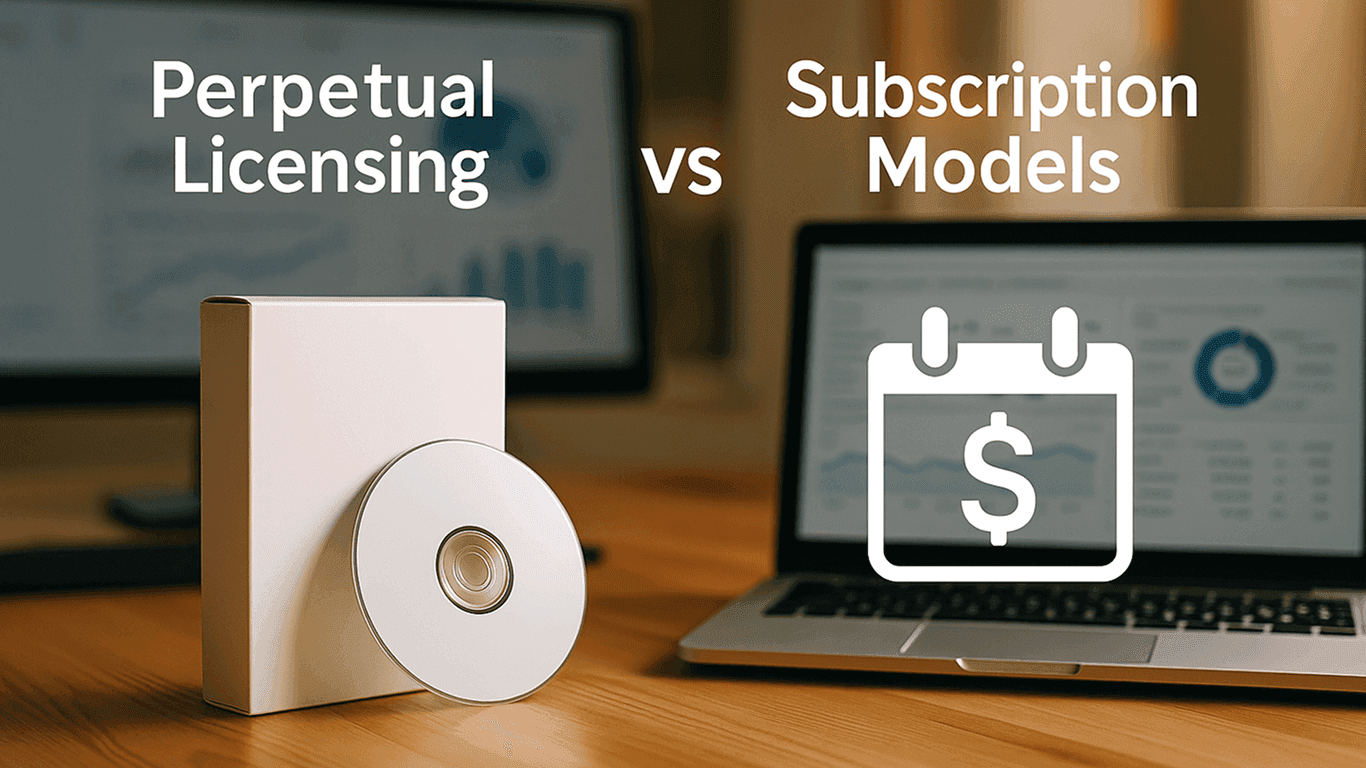Perpetual Licensing vs Subscription Models: Long-Term Business Value

Perpetual Licensing vs. Subscription Models
As software propels mainstay business processes, businesses are presented with a critical choice: embracing new subscription models or holding on to the tried-and-true reliability of perpetual licensing. While flexibility and ongoing updates are available through subscriptions, perpetual licensing is the preferred option for several enterprises that desire long-term value, control, and actual software ownership. These choices fall under a broader category known as software licensing models, which define how software is accessed, paid for, and managed.
In this blog post, we discuss both of these models and explain why perpetual licensing is the wiser, more strategic choice for organizations with established, long-term software requirements.
Perpetual licensing is a traditional software model in which users pay a single payment to use a particular version of the software for life. No recurring renewal fees are paid. The software becomes the property of the customer for good once bought. For most businesses, it is a lifetime software license.
A frequent query is: "Is a perpetual license lifetime?" Yes, when you choose a perpetual license for your business it never expires, it's just a one-time payment and you are ready to use the entire version of that software.The perpetual duration ensures that companies can rely on the software without worrying about renewal deadlines or access loss.
This model has a number of important advantages: it's paid for in one payment with no recurring monthly or yearly charges, gives lifetime usage of the product version, and affords users a great feeling of ownership. Companies can self-host the software on their own infrastructure, having complete control over how it's deployed, administered, and secured. This degree of control makes self-hosted software a first-rate option for firms valuing data privacy as well as regulatory compliance.
These advantages render perpetual licensing most appealing to firms having foreseeable and steady software requirements.
Unlike Perpetual licensing, the subscription model is based on a monthly payment system where you have to pay monthly or annually based on how the software plans is all about. This model usually has automatic upgrading, technical support, and sometimes cloud storage or other services.
It's usually preferred by startups or groups requiring flexibility and direct access to the most recent features. But customers don't actually own the software. The access is provided only as long as the subscription continues. When payment ceases, so does access. With time, the total amount of access costs paid over a period may be higher than the cost of a perpetual license that's paid one-time making it an even costlier choice over time.
While subscription models offer convenience, perpetual licensing provides unmatched long-term value and control. Here’s why it stands out:
Cost Savings Over Time
Perpetual licenses might appear costly at first blush. The one-time payment scheme, subscription not with standing, becomes more cost-effective in a number of years. Consider a perpetual license for ₹50,000 as compared to a subscription for ₹1,500/month, which works out to ₹90,000 over five years. For long-term customers using the software, perpetual licensing delivers straight forward cost avoidance.
Independence and Ownership
Perpetual licensing provides a feeling of real ownership. When you buy the software it belongs to you forever. This protects companies from sudden price hikes, subscription changes, or policy shifts from vendors. You're not dependent on continuous payments to retain access.
No Service Interruptions
Subscription models risk interruptions. Also you end the model once the pack is over. Permanent licenses mean the software remains functional in the face of external malfunctions. This reliability keeps critical business operations running uninterrupted.
Data Security and Control
Most businesses prefer on-premise software hosting, especially in highly regulated industries like healthcare, government, and manufacturing, where sensitivity, compliance, and security take center stage. With perpetual licensing, businesses have full control over deployment, configuration, and data storage something most subscription services do not provide. This makes self-hosted software a strategic necessity for compliance-driven environments.
Reliable and Consistent Environments
Organizations with established and stable processes appreciate software that does not constantly change. Subscription software tends to drive new updates that modify interfaces or features, halting productivity. Through perpetual licensing, companies can pin down a version that works and remain with it.
Realizing how software licensing models are developed can make us understand why the perpetual models remain relevant. Earlier in the history of enterprise software, perpetual licensing was common; companies would buy a license, install the software locally, and keep it under their own control. With the passage of time and the increase in internet connectivity as well as cloud computing, vendors started giving software as a service (SaaS) and brought the model of subscription.
This transition favored vendors with steady income and faster feature release to customers. It also raised long-term reliance on vendors and decreased control for users. Though the market transition occurred, most companies particularly those with internal IT staff and severe data security requirements still favor rapid licensing due to its stability, ownership, and security advantages.
Although subscription models are the norm for the software industry today, perpetual licensing remains an option that is secure, cost-effective, and viable for enterprises with long-term plans. It promises possession, predictability, and not paying on an ongoing basis ideal for enterprises that prefer control and predictability.
Subscription pricing is convenient and flexible, especially for rapid or short-term projects, but will not suit long-term financial and operational needs of all companies. For most companies, perpetual licensing continues to be a shrewd investment that harmonizes well with strategic planning and IT autonomy.
More blogs
No More blogs
